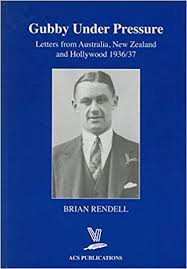Gubby Under Pressure
Martin Chandler |Published: 2007
Pages: 106
Author: Rendell, Brian
Publisher: ACS
Rating: 4 stars

The second of Brian Rendell’s books about Gubby Allen deals, unsurprisingly, with a similar subject to the first, Gubby Allen – Bad Boy of Bodyline. It is Allen’s letters once more, this time a rich cache of correspondence sent by Allen during his second tour of Australia, that of 1936/37.
MCC chose the Australian born all-rounder to lead them on a trip that was designed to heal the wounds that had been opened up by the ‘Bodyline’ furore of four years earlier. This time there was no Douglas Jardine or Harold Larwood and, with Allen at the helm, there was no prospect of Bill Voce, who had eventually made his peace with the selectors, being allowed to bowl any leg theory.
The 1936/37 trip is a largely forgotten one today, although it is certainly an interesting series. Under Allen England, thanks to a bit of luck and an out of sorts Bradman took a 2-0 lead, but then lost the remaining three Tests as Lady Luck deserted them at the same time as ‘The Don’ found his form.
The importance of the diplomatic aspects of the tour was reinforced in one of Allen’s early letters home when he observed that there is no doubt that we have got the press well on our side. In the same letter he quotes CB Fry, reporting on the series for the London Evening Standard, as saying Allen’s early speeches reminded him of someone stroking a cat. Allen seems to have taken the comment as a compliment although this reviewer suspects it was intended as anything but.
What did Allen think of his men, and in particular the remaining swollen headed, gutless, uneducated miner? Early on there was a positive comment; they simply couldn’t be a nicer lot, Voce included. He soon became rather disenchanted however, writing after Walter Robins fractured a finger and Bob Wyatt broke his arm that with Robbie and Bob injured it looks like I will have to captain, manage and ‘nurse’ the team for the next six weeks. He went on to complain of the pair that they don’t do a damn thing to help, and whilst he was not too harsh on tour manager Rupert Howard, on many occasions he expressed regret at Howard having insufficient experience to make important decisions without reference to Allen. There is, of course, an alternative explanation but that clearly did not occur to Allen.
To be fair to Allen he did carry a heavy burden, and the injuries to Wyatt and Robins did not help, but was it really necessary form to observe towards the end of the tour that actually I think we are a rotten side. The following list of complete failures speaks for itself, Robins, Worthington, Fagg, Fishlock and Sims. Wyatt was in the list too, but at least his injury was mentioned in mitigation and Hardstaff was criticised as well.
In an interesting parallell with Gubby Allen – Bad Boy of Bodyline one of those who had so irritated Allen wrote a letter to his father. Robins, a biography of whom is another title Rendell has to his credit, was the man concerned. Gubby has been magnificent was Robins verdict, adding that he is in great form and as fit as a fiddle.
All in all Allen’s letters home in 1936/37 demonstrate once again that he was not all that Jim Swanton sought to portray him as in Gubby Allen: Man of Cricket, perhaps not in quite the same way as in Gubby Allen – Bad Boy of Bodyline, but once again Allen does not come across as a likeable character (albeit one who was clearly a dutiful son).
The reality is that Gubby Under Pressure was never going to be as appealing as its predecessor, dealing as that did with the most famous Ashes series of them all, but in many ways it is just as interesting and once more does add to our knowledge of a well chronicled series. Add in that in this one the publisher, the ACS, found sufficient space to include a few photographs, some statistics, potted scores and, most importantly, a complete transcript of each of the 33 items of correspondence, and the book fully justifies another fours star rating for Brian Rendell.






Leave a comment